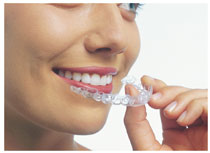Q. What is Invisalign?
Invisalign is an orthodontic treatment option that allows doctors to straighten teeth using a series of clear, removable, nearly invisible, plastic appliances called aligners.
Q. How does Invisalign work?
The patient meets with an Invisalign-trained dentist or orthodontist who takes orthodontic records of the patient’s teeth, including impressions, and fills out an Invisalign treatment planning or prescription form and sends all the material to Align Technology.
At Align, a computer model of the patient’s teeth is created from the impressions. Align then uses its advanced, 3-D imaging software to generate a graphical representation of the doctor’s treatment plan—almost like an animated movie of the way the patient’s teeth will move from the current position to the final desired position.
The doctor reviews and approves the rendering of his treatment plan (the 3-D movie) on a secure portion of Align’s website. Align Technology produces a series of clear, plastic aligners that correspond to the stages of tooth movement in the 3-D movie.
The patient wears each stage of aligners for approximately two weeks before switching to the next set in the series. Week by week, the patient’s teeth are straightened millimeter by millimeter.
Q. Is this a new way to straighten teeth?
Doctors have successfully used removable appliances for years for very limited treatment. With the application of 3-D computer technology and mass-customization, Invisalign can be used to treat almost anyone who wants straighter teeth. Please ask your dentist or orthodontist if you are a candidate.
Q. What are the primary benefits of Invisalign?
- Nearly invisible: You can straighten your teeth without anyone knowing.
- Removable: You can eat and drink what you want.
- Better oral hygiene: You can brush and floss normally to maintain healthy gums and teeth.
- Comfortable: There are no wires, metal or brackets to cause mouth abrasion.
Q. Who can benefit from Invisalign?
Experienced doctors can use Invisalign to treat the vast majority of people who want straighter teeth. According to the Journal of the American Dental Association, two-thirds to three-fourths of adults have some sort of malocclusion (crooked teeth) and could benefit from orthodontic treatment.
Q. How long does treatment take?
Like traditional braces, the length of treatment depends on the complexity of the case. Treatment time typically is about the same as conventional braces—about a year.
Q. Can any doctor treat patients with Invisalign?
Doctors must attend and complete an Invisalign training seminar to treat patients with Invisalign. Align also provides doctors with many opportunities for continuing education (CE) and advanced Invisalign training and requires that Invalign-trained doctors complete 10 CE hours annually.
Q. Does insurance cover Invisalign?
Typically, an insurance policy that covers traditional braces also covers Invisalign to the same extent. In addition, many doctors offering financing through companies such as Chase® or CareCredit® as well as in-office financing.
Q. How many people are in treatment with the Invisalign System?
More than 1 million patients worldwide have entered treatment with Invisalign.
More information is available at www.invisalign.com
Call us today to book your consultation!

